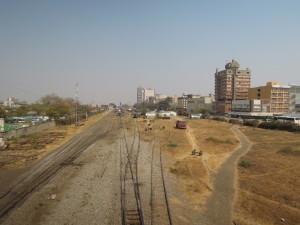The day when I finally left Lusaka, I first learnt one important lesson: It might be true that you should not enter a car with unknown men inside, yet the same holds for women. Before going to the airport, I wanted to go to the nearby mall (10 minutes walking distance) and 3 women kindly offered to drop me there, because they were anyway leaving the guest-house’s bar right away. Knowing the directions, I accepted and actually they did drive me to the mall via the expected route. But during the drive, I realized that they were already a little drunk (it was 10 in the morning ….) and they started making obvious approaches to me, putting their both “arguments” in front. This phenomenon is quite common in Africa – white men often are an attractive goal for black women, and in fact many men take the advantage of these easy girls, especially in the new region I recently arrived to. For myself, in such situations I usually adopt the name Bertrand Delanoë and with that his sexual orientation!
Despite this slightly strange event, I arrived to Lusaka Airport on time and got my flight without any problems. As planned, we landed in Addis Ababa on the evening and I was ready to sleep at the airport because the following flight to my final destination was scheduled on the next morning. But a friendly officer from Ethiopian Airlines had a nice surprise for me: the company would offer me a hotel voucher to spend the night and have dinner and breakfast on their expenses. So I received a transit visa, I was transferred to the city and reached probably one of the most luxurious hotels of my whole trip so far. While all other guests had to sleep in “normal” rooms on the middle floors, without any reason I was given the key to the royal suite on the last floor, with a beautiful view over Addis by night. I guess that they had read our blog entries about Ethiopia and thought that they had something to compensate. Continue reading


